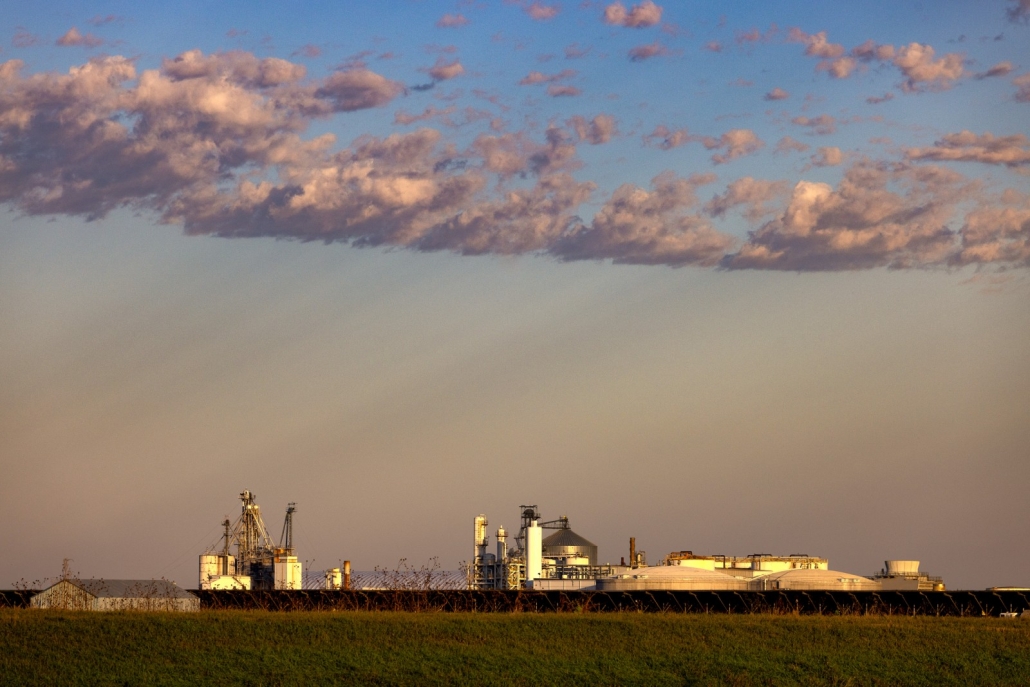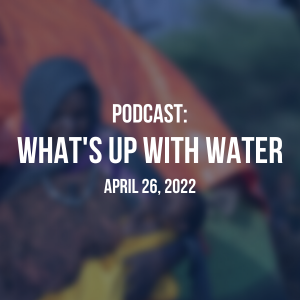The Stream, April 27, 2022: How a Rural Nebraskan Town Is Moving Forward a Year After Toxic Ethanol Plant Closes

Nebraska agriculture is a behemoth. More than nine out of every 10 acres in the 49.5 million-acre state is given over to farms and ranches. Photo © J. Carl Ganter/ Circle of Blue
YOUR GLOBAL RUNDOWN
- Residents in a major neighborhood in Lagos, Nigeria lack access to clean drinking water and say their government has abandoned them.
- A Nebraska town remains divided on the best strategy for remediation after years of pollution contaminated water supplies and caused health problems.
- Officials in England report record-high numbers of water pollution violations from the nation’s farms.
- U.S. researchers study the impact wildfires have on state water supplies.
Biodiversity experts say climate catastrophes are destroying the habitats of African animal species.
“Climate change is disrupting ecosystems and affecting the survival and suitability of species to live in their usual habitats.”
– Shyla Raghav, Vice President of Climate Change at Conservation International.
Experts say extreme weather events in Africa are wreaking havoc on the continent’s wildlife. Climate-induced disasters like floods, droughts, and extreme heat are disrupting marine and terrestrial ecosystems, biodiversity experts told the Associated Press. Raghav said officials should prioritize resilience and adaptation strategies to preserve precious animal populations.
In Recent Water News
HotSpots H2O: ‘We Have Nowhere Left To Go’: Durban’s Affordability Crisis Pushed Development into Flood Zones – Homes in high-risk flood zones are the only affordable option for Durban’s poorest residents.
What’s Up With Water—April 26, 2022 – This week’s episode of What’s Up With Water covers paying for groundwater in California and a controversial canal project in Nebraska. Plus, Circle of Blue reports on the links between Russia’s War in Ukraine and global food crises.
Lagos Neighborhood Lacks Clean Water and Proper Infrastructure After Years of Neglect from Federal Government
Ajegunle, a large neighborhood in Lagos, Nigeria, lacks potable water and proper water infrastructure. The Guardian Nigeria reports that years of neglect from the Nigerian government has made the area prone to flooding, and has left residents vulnerable to starvation and disease. The chairman of the Ajegunle Community Development Area, Sunday Awobona, said the biggest challenge facing the community is access to clean drinking water. “We don’t have water to drink and we wonder if we have a government,” he said.
This Week’s Top Water Stories, Told In Numbers
500 PEOPLE
A year after state regulators closed an ethanol plant after toxic waste was “accidentally spilled and intentionally spread” across farm fields and contaminated water supplies in Mead, Nebraska, residents are torn on the best path to remediation. Some of the village’s 500 residents have reported personal health problems and ecological decay, but deciding how to move forward from the disaster has divided the community. Some have called on the Environmental Protection Agency to mark parts of Mead a Superfund site, although others say the declaration would be costly and shrink already-decreasing property values. The ethanol plant AltEn had been producing massive amounts of toxic waste for years before it was shut down. Researchers at the University of Nebraska Medical Center are currently conducting a study on the plant’s long-term health impact.
In Context: Other parts of Nebraska are struggling to deal with another toxic chemical. Earlier this year, an investigation by Circle of Blue uncovered compelling evidence suggesting that high numbers of pediatric cancer cases are associated with state watersheds that have high levels of nitrate (a fertilizer) or atrazine (a weed killer) in surface and groundwater, according to a UNMC research team.
391 VIOLATIONS
In the past year, officials in England recorded 391 violations of water pollution farms implemented more than four years ago to keep agricultural contamination under control. Despite the record-high number of violations, the Guardian reported late last week that the U.K. Environmental Agency had yet to issue any fines or prosecute farmers.
On the Radar
Researchers in the United States are studying the impact wildfires have on water supplies. Past research has shown that snow in a forest that has been burned by a wildfire melts weeks earlier than normal due to a lack of shade and carbon shedding from trees that absorbs sunlight faster. Experts like Noah Molotch, who studies water and snow cycles at the University of Colorado, Boulder, said burned areas “exacerbate the impact of drought.” As western states gear up for what is predicted to be another dry summer, some officials in wildfire-affected states are beginning to map snow levels from planes, and others are constructing remote sensing stations as well.
Why It Matters: Drought, the “everything disaster,” can increase the risk of fire, Circle of Blue reported last summer. But fires in river headwaters don’t just burn trees and impact snowpack and spring runoff. They also send ash and debris into reservoirs and rivers. The Las Conchas fire in northern New Mexico in 2011 pumped so much ash into the Rio Grand that the Albuquerque Bernalillo County Water Utility Authority had to close its drinking water intake on the river. When they rampage through developed areas, fires can contaminate plumbing systems and water distribution pipes with volatile organic chemicals.
More Water News
A federal court in Brazil upheld a previous ruling that suspended a key environmental license for a proposed open-pit gold mine in the Amazon rainforest.
Farmers in Madagascar are turning to a drought-resistant crop to grow food amid a prolonged dry spell.
A state audit found that the Metropolitan Water District of Southern California, the agency that provides water to millions in Southern California, failed to properly handle misconduct complaints after several women came forward last year with allegations of harassment and bullying.
The governor of Maine signed a bill last week granting the Passamaquoddy Tribe reservation the authority to regulate their own drinking water after years of complaints about contamination from tribe members.
Jane is a Communications Associate for Circle of Blue. She writes The Stream and has covered domestic and international water issues for Circle of Blue. She is a recent graduate of Grand Valley State University, where she studied Multimedia Journalism and Women, Gender and Sexuality Studies. During her time at Grand Valley, she was the host of the Community Service Learning Center podcast Be the Change. Currently based in Grand Rapids, Michigan, Jane enjoys listening to music, reading and spending time outdoors.






Leave a Reply
Want to join the discussion?Feel free to contribute!